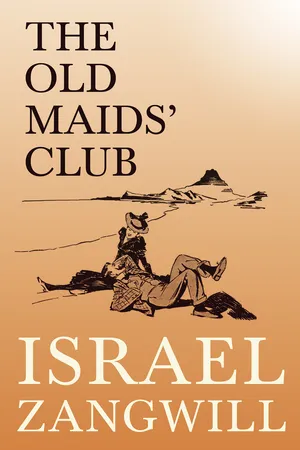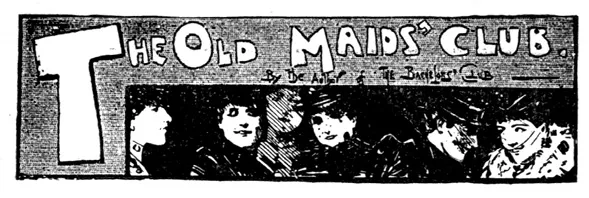
eBook - ePub
The Old Maids' Club
With a Chapter From English Humorists of To-day by J. A. Hammerton
- 312 pages
- English
- ePUB (mobile friendly)
- Available on iOS & Android
eBook - ePub
The Old Maids' Club
With a Chapter From English Humorists of To-day by J. A. Hammerton
About this book
"The Old Maids' Club" is a 1892 novel by British author Israel Zangwill (1864–1926). Wonderfully illustrated throughout and not to be missed by fans and collectors of Zangwill's work. Zangwill was a leading figure in cultural Zionism during the 19th century, as well as close friend of father of modern political Zionism, Theodor Herzl. In later life, he renounced the seeking of a Jewish homeland in Palestine. Other notable works by this author include: "Dreamers of the Ghetto" (1898), "Ghetto Tragedies" (1899), and "Ghetto Comedies" (1907). This classic work is being republished now in a new edition complete with an introductory chapter from "English Humourists of To-Day" by J. A. Hammerton.
Frequently asked questions
Yes, you can cancel anytime from the Subscription tab in your account settings on the Perlego website. Your subscription will stay active until the end of your current billing period. Learn how to cancel your subscription.
No, books cannot be downloaded as external files, such as PDFs, for use outside of Perlego. However, you can download books within the Perlego app for offline reading on mobile or tablet. Learn more here.
Perlego offers two plans: Essential and Complete
- Essential is ideal for learners and professionals who enjoy exploring a wide range of subjects. Access the Essential Library with 800,000+ trusted titles and best-sellers across business, personal growth, and the humanities. Includes unlimited reading time and Standard Read Aloud voice.
- Complete: Perfect for advanced learners and researchers needing full, unrestricted access. Unlock 1.4M+ books across hundreds of subjects, including academic and specialized titles. The Complete Plan also includes advanced features like Premium Read Aloud and Research Assistant.
We are an online textbook subscription service, where you can get access to an entire online library for less than the price of a single book per month. With over 1 million books across 1000+ topics, we’ve got you covered! Learn more here.
Look out for the read-aloud symbol on your next book to see if you can listen to it. The read-aloud tool reads text aloud for you, highlighting the text as it is being read. You can pause it, speed it up and slow it down. Learn more here.
Yes! You can use the Perlego app on both iOS or Android devices to read anytime, anywhere — even offline. Perfect for commutes or when you’re on the go.
Please note we cannot support devices running on iOS 13 and Android 7 or earlier. Learn more about using the app.
Please note we cannot support devices running on iOS 13 and Android 7 or earlier. Learn more about using the app.
Yes, you can access The Old Maids' Club by Israel Zangwill,F. H. Townsend,J. A. Hammerton in PDF and/or ePUB format. We have over one million books available in our catalogue for you to explore.
Information
Publisher
Read & Co. ClassicsYear
2020Print ISBN
9781528715799eBook ISBN
9781528790062.

CHAPTER I
THE ALGEBRA OF LOVE, PLUS OTHER THINGS
The Old Maids' Club was founded by Lillie Dulcimer in her sweet seventeenth year. She had always been precocious and could analyze her own sensations before she could spell. In fact she divided her time between making sensations and analyzing them. She never spoke Early English—the dialect which so enraged Dr. Johnson—but, like John Stuart Mill, she wrote a classical style from childhood. She kept a diary, not necessarily as a guarantee of good faith, but for publication only. It was labelled "Lillie Day by Day," and was posted up from her fifth year. Judging by the analogy of the rest, one might construct the entry for the first day of her life. If she had been able to record her thoughts, her diary would probably have begun thus:—
"Sunday, September 3rd: My birthday. Wept at the sight of the world in which I was to be so miserable. The atmosphere was so stuffy—not at all pleasing to the æsthetic faculties. Expected a more refined reception. A lady, to whom I had never been introduced, fondled me and addressed me as 'Petsie-tootsie-wootsie.' It appears that she is my mother, but this hardly justifies her in degrading the language of Milton and Shakespeare. Later on a man came in and kissed her. I could not help thinking that they might respect my presence; and, if they must carry on, continue to do so out of my sight as before. I understood later that I must call the stranger 'Poppy,' and that I was not to resent his familiarities, as he was very much attached to my mother by Act of Parliament. Both the man and the woman seem to arrogate to themselves a certain authority over me. How strange that two persons you have never seen before in your life should claim such rights of interference! There must be something rotten in the constitution of Society. It shall be one of my life-tasks to discover what it is. I made a light lunch off milk, but do not care for the beverage. The day passed slowly. I was dreadfully bored by the conversation in the bedroom—it was so petty. I was glad when night came. O, the intolerable ennui of an English Sunday! I divine already that I am destined to go through life perpetually craving for I know not what, and that I shan't be happy till I get it."
Lillie was a born heroine, being young and beautiful from her birth. In her fourth year she conceived a Platonic affection for the boy who brought the telegrams. His manners had such repose. This was followed by a hopeless passion for a French cavalry officer with spurs. Every one feared she would grow up to be a suicide or a poetess; for her earliest nursery rhyme was an impromptu distich discovered by the nursery-maid, running:
Woonded i crawl out from the battel,
Life is as hollo as my rattel.
Life is as hollo as my rattel.
And her twelfth year was almost entirely devoted to literary composition of a hopeless character, so far as publishers were concerned. It was only the success of "Woman as a Waste Force," in her fourteenth year, that induced them to compete for her early manuscripts and to give the world the celebrated compilations, "Ibsen for Infants," "Browning for Babies," "Carlyle for the Cradle," "Newman for the Nursery," "Leopardi for the Little Ones," and "The Schoolgirl's Schopenhauer," which, together with "Tracts for the Tots," make up the main productions of her First Period. After the loss of the French cavalry officer she remained blasée till she was more than seven, when her second grand passion took her. It was a very grand passion indeed this time—and it lasted a full week. These things did not matter while Lillie had not yet arrived at years of indiscretion; but when she got into her teens, her father began to look about for a husband for her. He was a millionaire and had always kept her supplied with every luxury. But Lillie did not care for her father's selections, and sent them all away with fleas in their ears instead of kind words. And her father was as unhappy as his selections. In her sixteenth year her mother, who had been ailing for sixteen years, breathed her last, and Lillie more freely. She had grown quite to like Mrs. Dulcimer, and it prevented her having her own way. The situation was now very simple. Mr. Dulcimer managed his immense affairs and Lillie managed Mr. Dulcimer.
He made one last effort to get her to manage another man. He discovered a young nobleman who seemed fond of her society and who was in the habit of meeting her accidentally at the Academy. The gunpowder being thus presumably laid, he set to work to strike the match. But the explosion was not such as he expected. Lillie told him that no man was further from her thoughts as a possible husband.
"But, Lillie," pleaded the millionaire, "not one of the objections you have impressed upon me applies to Lord Silverdale. He is young, rich, handsome—"
"Yes, yes, yes," answered Lillie, "I know."
"He is rich and cannot be after your money."
"True."
"He has a title, which you consider an advantage."
"I do."
"He is a man of taste and culture."
"He is."
"Well, what is it you don't like? Doesn't he ride or dance well?"
"He dances like an angel and rides like the devil."
"Well, what in the name of angels or devils is your objection then?"
"Father," said Lillie very solemnly, "he is all you claim, but—." The little delicate cheek flushed modestly. She could not say it.
"But—" said the millionaire impatiently.
Lillie hid her face in her hands.
"But—" said the millionaire brutally.
"But I love him!"
"You what?" roared the millionaire.
"Yes, father, do not be angry with me. I love him dearly. Oh, do not spurn me from you, but I love him with my whole heart and soul, and I shall never marry any other man but him." The poor little girl burst into a paroxysm of weeping.
"Then you will marry him?" gasped the millionaire.
"No, father," she sobbed solemnly, "that is an illegitimate deduction from my proposition. He is the one man on this earth I could never bring myself to marry."
"You are mad!"
"No, father. I am only mathematical. I will never marry a man who does not love me. And don't you see that, as I love him, the odds are that he doesn't love me?"
"But he tells me he does!"
"What is his bare assertion—weighed against the doctrine of probability! How many girls do you suppose Silverdale has met in his varied career?"
"A thousand, I dare say."
"Ah, that's only reckoning English Society (and theatres). And then he has seen Society (and theatres) in Paris, Berlin, Rome, Boston, a hundred places! If we put the figure at three thousand it will be moderate. Here am I, a single girl—"
"Who oughtn't to remain so," growled the millionaire.
"One single girl. How wildly improbable that out of three thousand girls, Silverdale should just fall in love with me. It is 2999 to 1 against. Then there is the probability that he is not in love at all—which makes the odds 5999 to 1. The problem is exactly analogous to one which you will find in any Algebra. Out of a sack containing three thousand coins, what are the odds that a man will draw the one marked coin?"
"The comparison of ...
Table of contents
- Israel Zangwill
- CHAPTER I
- CHAPTER II
- CHAPTER III
- CHAPTER IV
- CHAPTER V
- CHAPTER VI
- CHAPTER VII
- CHAPTER VIII
- CHAPTER IX
- CHAPTER X
- CHAPTER XI
- CHAPTER XII
- CHAPTER XIII
- CHAPTER XIV
- CHAPTER XV
- CHAPTER XVI
- CHAPTER XVII
- CHAPTER XVIII
- CHAPTER XIX
- CHAPTER XX